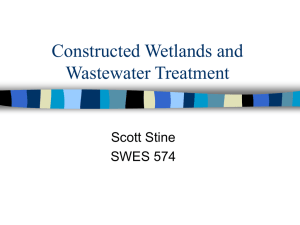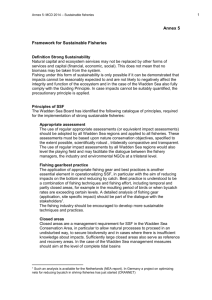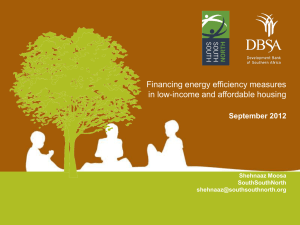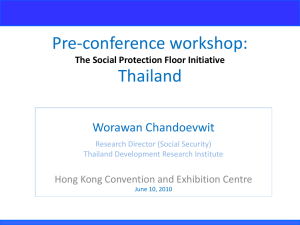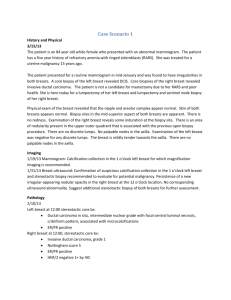TBTI WG6 and Europe Meeting_summary_draft.
advertisement
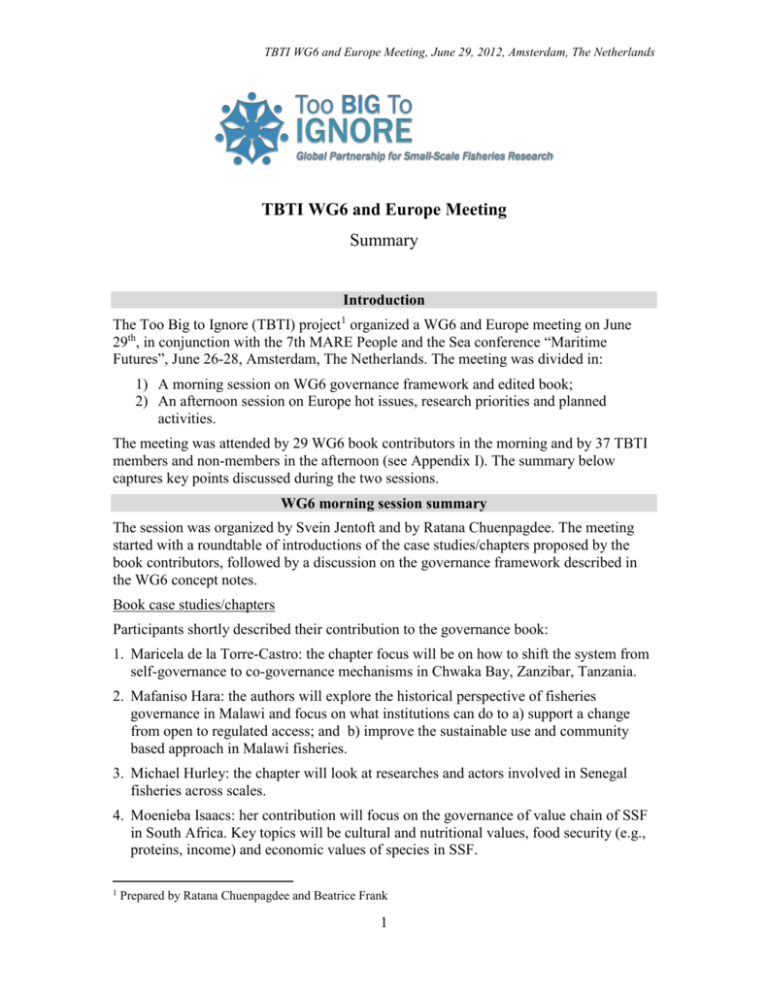
TBTI WG6 and Europe Meeting, June 29, 2012, Amsterdam, The Netherlands TBTI WG6 and Europe Meeting Summary Introduction The Too Big to Ignore (TBTI) project1 organized a WG6 and Europe meeting on June 29th, in conjunction with the 7th MARE People and the Sea conference “Maritime Futures”, June 26-28, Amsterdam, The Netherlands. The meeting was divided in: 1) A morning session on WG6 governance framework and edited book; 2) An afternoon session on Europe hot issues, research priorities and planned activities. The meeting was attended by 29 WG6 book contributors in the morning and by 37 TBTI members and non-members in the afternoon (see Appendix I). The summary below captures key points discussed during the two sessions. WG6 morning session summary The session was organized by Svein Jentoft and by Ratana Chuenpagdee. The meeting started with a roundtable of introductions of the case studies/chapters proposed by the book contributors, followed by a discussion on the governance framework described in the WG6 concept notes. Book case studies/chapters Participants shortly described their contribution to the governance book: 1. Maricela de la Torre-Castro: the chapter focus will be on how to shift the system from self-governance to co-governance mechanisms in Chwaka Bay, Zanzibar, Tanzania. 2. Mafaniso Hara: the authors will explore the historical perspective of fisheries governance in Malawi and focus on what institutions can do to a) support a change from open to regulated access; and b) improve the sustainable use and community based approach in Malawi fisheries. 3. Michael Hurley: the chapter will look at researches and actors involved in Senegal fisheries across scales. 4. Moenieba Isaacs: her contribution will focus on the governance of value chain of SSF in South Africa. Key topics will be cultural and nutritional values, food security (e.g., proteins, income) and economic values of species in SSF. 1 Prepared by Ratana Chuenpagdee and Beatrice Frank 1 TBTI WG6 and Europe Meeting, June 29, 2012, Amsterdam, The Netherlands 5. Merle Sowman: the authors will discuss governance issues of the Western Cape’s linefishery using marine protected areas (MPA) case studies. Mobile and sedentary fisheries will be compared by looking at access rights and disjunction between policy and practice. 6. Estelle Jones: MPA with different governance approaches will be considered in Ranong and Phang-nga, Thailand, to identify factors, key supports and barriers to selfgovernance and capacity building in fisher communities. 7. Alice Ferrer: her chapter will focus on hierarchical governance and the impacts of this approach to SSF in two national marine protected areas in the Philippines. 8. Andrew Song: the shift from a traditional and hierarchical governance to a more collaborative, community based governance will be portrayed through value images, principles and the governability concept in South Korea. 9. Vriddagiri Vivekanandan: in Tamil Nadu different sets of “governors” pursue dissimilar objectives and approaches to manage marine fisheries. A co-management case study that brings together different stakeholders is explored to understand how to move towards sustainable fisheries and greater social justice in India. 10. Cedric Boisrobert: a Philippine case study on the decentralization of reforms and on impacts to SSF will be used in this chapter to investigate to what extent fishers can become better governors. 11. Svein Jentoft: SSF are deeply affected by ITQ’s systems. The survival of these fisheries does not only depend on the governability and governmentality of the system, but also on the ability of communities to adapt. In this chapter, the conditions for adaptamentality are investigated in Norwegian SS fishing fleets. 12. Svein Jentoft: the chapter focuses on how the neoliberal ITQ’s approach has altered the Icelandic fishing communities and society. 13. Jose J. Pascual-Fernandez: this contribution will center on the governability challenges derived from conflicts between stakeholders (e.g., recreational fishers, SSF) over the establishment and implementation of MPA in the Canaries Island. 14. Easkey Britton: the author will explore how current governance practices are affecting the inshore herring SSF in Northern Ireland. Key topics will be fishing allocation rights (e.g., SSF vs. large-scale industrial fleets), access limitations, traditional fishing practices and communities livelihood. 15. Katia Frangoudes: the author will describe the historical evolution of kelp harvest arrangements between fishers organization, the processing industry and national administration in the Iroise Sea, France. The governability framework will help better understand the management dynamics and stakeholders interactions in this MPA. 16. María José Barragán Paladines: the dominant values, images and principles, the reasons behind conflicts, and the mechanisms of operation and performance will be explored to characterize the governability context of SSF in Ecuador. 2 TBTI WG6 and Europe Meeting, June 29, 2012, Amsterdam, The Netherlands 17. Iris Monnereau: the role of small-scale lobster fisheries in fostering livelihood opportunities and income in the Caribbean region, and the governing modes of such fisheries in Belize and Nicaragua are the central theme of this chapter. 18. Fabio de Castro: in Paraty, southern coast of Brazil, complex territorial arrangement (e.g., MPA, ethnic territories, touristic sites, industrial activities) overlap. The authors will analyze fisheries governance issues and mechanisms that foster social inclusion, knowledge building, and power sharing for use and monitoring of fish resources. 19. Leopoldo Cavaleri Gerhardinger: assessing the governability framework of fisheries systems present in 'Baleia Franca Environmental Protection Area' in Santa Catarina state, South Brazil, is the key topic of this contribution. 20. Olivier Randin: the Colombian department of San Andrés and Old Providence (Caribbean) applies a multi-zone MPA approach to manage its marine resources. Asymmetry in power sharing between stakeholders and the loss of marine territory to Nicaragua make the governance of such resources complex and interesting to explore. 21. Adam Soliman: in Alaska, ITQ’s includes non-profit Community Quota Entities (CQEs) that consider non-market-based exceptions and structures to support remote communities, smaller fishing operations, and/or traditional and aboriginal fisheries. In this chapter, the author will analyse the governance structure, the barriers and benefits of such CQEs system. 22. Sharmane Allen: examining the implementation of the principles and policy objectives of the Atlantic Fisheries Policy Framework in relation to the governance of SSF in the Coast of Bays Region of Newfoundland is the key theme of this contribution. 23. Kevin St. Martin: in New England voluntary collectives of fishermen have organized themselves in “sectors”. The new governmentality framework offered by these sectors who’s fishing approaches span from neoliberal agendas of privatization and individualization to community supported fishing are explored. 24. Patrick McConney: this contribution focuses on the processes and conditions for establishing, implementing and sustaining adaptive co-management in sea urchin fisheries in Barbados and Saint Lucia. The authors will approach co-governance from a social-ecological fisheries perspective. 25. Alyne Delaney: the author will explore how the experience of consolidation of Japanese SSF has influenced local levels and how power and responsibility in managing resources has taken shape in this new era of fishing cooperatives. 26. Derek Johnson: the introduction of an individual quota system and of the Freshwater Fish Marketing Corporation in Lake Winnipeg has led to a successful SSF governability approach. Lesson learned from this innovative management approach are the focal point of this contribution. Governance framework Participants described the governance framework as inspiring since it helps understanding values, images and principles and represents a holistic approach for analyzing systems. The 3 TBTI WG6 and Europe Meeting, June 29, 2012, Amsterdam, The Netherlands framework has a synthetic power and enables authors to ground their case studies in the real world. It has dynamic and tridimensional features that can be easily adapted to different situations and locations. The framework emphasis normative aspects and helps identifying similarities and differences between stakeholders. In summary, this instrument is divers, complex and dynamic mirroring the system authors look at. To enable a cross-comparison between case studies, a coherent theoretical approach and governance perspective is key. The table in the concept notes represent a guideline for contributors to approach and analyse their case study. Authors should try to situate their case study in the table, answer some of the questions included in the framework and focus on one or more governance systems described in the concept notes. The questions provided by the editors are not exhaustive and can be implemented with new ones by the authors. Contributors should also reflect on the framework process and share their ideas on how to improve this instrument. A coherent governance approach will enable to obtain a strong statement on SSF governance in the closing chapter of the book. The conclusions of the volume will be a collective statement of the authors about the lesson learned by using the governance framework across case studies. WG6 afternoon session summary The afternoon session was organized by Maarten Bavinck, Jose J. Pascual-Fernandez and by Ratana Chuenpagdee and consisted of an overview about TBTI, followed by a session on Europe hot issues, research priorities and planed activities. The summary below captures key points discussed during the session. TBTI overview After a short description of the state of the art of the TBTI project, participants engaged in a discussion about key themes, possible contributions and ways to implement research. The importance of compiling WG1 surveys was emphasized in the session. Surveys helps identifying gaps in research, enhancing connection and capacity development between researchers and influencing policies in different regions and at different scales. WG2 is organizing an interactive capacity building workshop in Africa to demonstrate SSF value and implement WG2 economic viability framework. The challenges encountered by the region is mobilizing knowledge and funding to involve practitioner in the workshop. Nayak Prateep reported an example of effective practitioner engagement where 35-40 scientist meet regularly to discuss lagoon issues. He proposed to connect this group to TBTI for knowledge sharing and to explore their practitioner engagement approaches. Fabiano Grecco de Carvalho suggests art as a way to engage and connect practitioners/scientists to communities. This summer he will travel across the Brazilian coast to connect with SSF and share knowledge with local communities. Participants perceived global seafood trade as an important topic to be consider while exploring SSF. This theme is key in the current and future market position of the EU. Fabio de Castro would like to develop a monitoring project to evaluate a 10-15 year long SSF co-management program in the amazon. He wonders how to approach the project (i.e, what can he do, what can he use) to obtain a solid evaluation. 4 TBTI WG6 and Europe Meeting, June 29, 2012, Amsterdam, The Netherlands Europe hot issues, research priorities and planed activities Europe will focus on addressing gaps in knowledge about European SSF, enhancing governance and implementing the current EU fishery reforms. Reports about fisheries lack of consistent and clear information about the SSF sector. Employments rates in SSF are often underreported and data about social issues related to SSF are lacking. For example, the decrease of SSF due to aging fishing communities and the role of women in the sector are not reported. A key research for the region should be an analysis of European SSF characteristics, of the state of the art of research in this sector, on SSF organizations and on Fisheries Local Action Groups (e.g., European Maritime and Fishery-Axis 4). One of the milestone of the Europe region has been organizing the Policy Day on June 25th in Amsterdam, the Netherlands (for more information see http://toobigtoignore.net/?p=1157). The scope of this event was to bring people together and discuss important SSF issue and governance in Europe. For example, one of the key themes of the day has been the impacts of the European Maritime and Fishery Fund on SSF. In the fishery market, SSF high quality manufactured product is not differentiated from lower quality LSF industrial merchandise. There is a need to understand better the institutions and policies operating in the EU fishery market. SSF are not properly supported, funds are limited and often not effectively used. The EU has provided economic support mostly for aquaculture development. Such approach has not always represented a successful alternative for SSF. To explore what opportunities and niches exists for SSF, the Europe region is planning to carry out a study on fishery markets at EU level. The research will focus on: 1) collecting existing data; 2) investigating how SSF sell and market their products; and 3) evaluating the quantity and prices of fishes sold by SSF. The geographical scale of the research need to be evaluated carefully as some European countries (e.g., Russia, Norway, Iceland) are not EU members. Issues such as how SSF organize themselves to sell their products and how to add value to the SSF landing need to be considered. The planned study relates to other TBTI WG and region as Europeans policies and consumer approaches toward fish products deeply influences other markets around the world. Especially, the questions explored by WG4-WG6 can be relevant for this study. 5 TBTI WG6 and Europe Meeting, June 29, 2012, Amsterdam, The Netherlands Appendix I: Participants of the TBTI WG6 and Europe Meeting workshop Name Sharmane Allen Institute/Community Memorial University, Canada E-mail T85sfma@mun.ca María José Barragán Paladines Memorial University , Canada majobarraganp@yahoo.es Maarten Bavinck University of Amsterdam, The Netherlands University of Amsterdam, The Netherlands Memorial University, Canada j.m.bavinck@uva.nl Eny.buchary@stockholmresilience.su.se Leopoldo Cavaleri Gerhardinger Stockholm Resilience Centre, Sweden Campinas State University, Brazil Fabio de Castro Campinas State University, Brazil f.decastro@cedla.nl Ratana Chuenpagdee Memorial University, Canada ratanac@mun.ca Beatrice Crona* Stockholm Resilience Center, Sweden Innovative Fisheries Management (IFM-AAU), Denmark Stockholm University, Sweden Beatrice.crona@stockholmresilience.su.se Alice Ferrer University of the Philippines, Philippines aj_ferrer2005@yahoo.com Katia Frangoudes University of Brest, France Katia.frangoudes@univ-brest.fr Fabiano Grecco de Carvalho * Associacao de Estudos Costeiros e Marinhos, Brazil f.96271504@gmail.com Maria Hadjimichael Aalborg University, Denmark mmh@ifm.aau.dk Mafaniso Hara mhara@uwc.ac.za Denis Hellebrandt* University of Western Cape, South Africa University of East Anglia , UK Michael Hurley LiveWater International, USA michaelhurley@livewaterllc.com Svein Jentoft University of Tromso, Norway svein.jentoft@uit.no Derek Johnson University of Manitoba, Canada johnso39@cc.umanitoba.ca Estelle Jones Newcastle University, UK Estelle.jones@ncl.ac.uk Moenieba Isaacs University of Western Cape, South Africa University of West Indies, Barbados misaacs@uwc.ac.za monnereau@hotmail.com Jose J. Pascual-Fernandez CERMES, University of West Indies, Barbados University of La Laguna, Spain Graham Pierce* University of Aberdeen, UK g.j.pierce@abdn.ac.uk Cristina Pita* Universidade de Aveiro , Portugal c.pita@abdn.ac.uk Nayak Prateep* University of Waterloo, Canada Olivier Randin Univerity of Tromso, Norway Cedric Boisrobert Easkey Britton Eny Buchary* Alyne Delaney Maricela de la Torre-Castro Patrick McConney Iris Monnereau 6 cboisrobert@gmail.com easkeysurf@gmail.com leocavaleri@gmail.com ad@ifm.aau.dk maricela@natgeo.su.se d.hellebrandt@uea.ac.uk patrick.mcconney@cavehill.uwi.edu jpascual@ull.es pnayak@uwaterloo.ca ora006@post.uit.no TBTI WG6 and Europe Meeting, June 29, 2012, Amsterdam, The Netherlands Name Adam Soliman Institute/Community University of Arkansas, USA E-mail adamsoliman@me.com Andrew Song Memorial University, Canada amsong@mun.ca Merle Sowman Merle.sowman@uct.ac.za Heidi Schuttenberg University of Cape Town, South Africa University of Aberdeen, UK Kevin St. Martin Rutgers University , USA kstmarti@rci.rutgers.edu Vriddagiri Vivekanandan Fisheries Management Resource Centre, India FAO, Italy vivek@siffs.org Rolf Willman* * Participants that joined the meeting from the afternoon session on. 7 heidi.schuttenberg@gmail.com Rolf.willmann@fao.org
